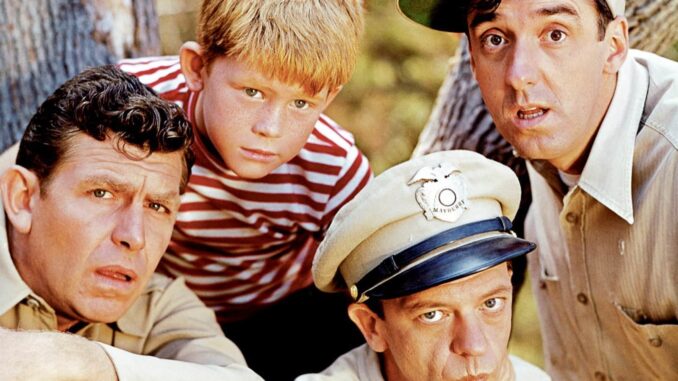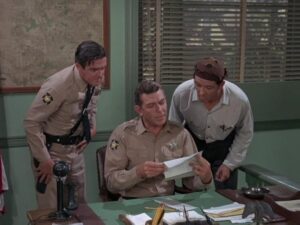
Andy Griffith was one of the greatest performers in television history. His portrayal of Mayberry, North Carolina, sheriff Andy Taylor is one of the most sustained feats of comic subtlety and grace in any medium. Griffith did a lot before and after The Andy Griffith Show, but that series will remain the cornerstone of his achievement.
The idyllic haven of Mayberry was helped into creation by two city slickers, producer Sheldon Leonard and comedian-producer Danny Thomas. They built a vehicle for Griffith’s talents. They used the popular Danny Thomas Show sitcom to launch the series with a 1960 episode titled “Danny Meets Andy Griffith,” which introduced the Andy Taylor character. In early episodes, Andy was a little bit more naive, less assured, than the character eventually became. Griffith owned 50% of the series, and soon enough, he became the true auteur of the show, overseeing the writing, editing, and tone of the show. He modeled Mayberry on the real town he knew, Mt. Airy, North Carolina (many of the show’s streets, businesses, and even townspeople were named after real Mt. Airy counterparts).
Griffith’s Andrew Jackson Taylor was a humble but wise man, perfectly suited to small-town law enforcement. He was the very definition of a peacekeeper, someone who strove to bring people together in harmony, not matter how petty or major their disagreements. He employed a bumbling deputy — Don Knotts’ superb Barney Fife — and was a widower whose son, Opie (future director Ron Howard), was cared for by his sweet, gossipy yet prim Aunt Bee (Frances Bavier) — the woman who’d raised Andy. Andy was really the show’s straight man: Griffith wanted to react to the antics of Knotts and other characters such as the flighty barber Floyd, the droll drunkard Otis, and gas station attendant Gomer (Jim Nabors).

It was Griffith’s genius to keep the tone of the show sap-free; he understood that there was little place for sentimentality in maintaining the law or raising a son. Sheriff Andy strove to create an air of relaxation — hence the famous opening credits, featuring a whistled theme song that showed Andy and Opie, poles in hand, headed for a quiet afternoon at the fishin’ hole — even as he maintained dignity, his own and protecting the dignity of others in town, especially when outsiders, usually “sophisticated,” high-energy people from urban areas, ventured into Mayberry. Those invaders soon learned that the pace of life in Mayberry may be slow, but the sheriff’s mind was as quick and incisive as a bear trap.
Among the episodes that the show’s devoted and enduring fan base invariably selects as the best are “The Pickle Story” (a demonstration of how one must protect the feelings of our loved ones, as Aunt Bee makes her dreadful-tasting “kerosene cucumbers” for a town contest), “Opie the Birdman” (Opie accidentally kills a songbird, and learns from his father the importance of taking responsibility for one’s actions) and “Man in a Hurry” (a rushed, anxious businessman’s car breaks down in Mayberry, and the courtesy and calmness of Andy and his community have a miraculously soothing effect on the agitated man).
I think most people looked at Andy Taylor — and burrowing deeper, at Andy Griffith — with the same grave trust Howard’s Opie did: We felt that here was an actor who was to be trusted, wherever he was taking us.
Griffith began his career as a storyteller and stand-up comedian. His stand-up act played on his Southern roots; he presented himself as an earnest bumpkin who told long, relaxed, shaggy-dog stories, the most famous of which, in the 1950s, was a routine called “What it was, was football,” which made him a popular live act and a big record-seller at a time when comedy albums were just taking off as a thriving commercial genre. Griffith was very much in the folksy tradition, from Will Rogers to Tennessee Ernie Ford.
